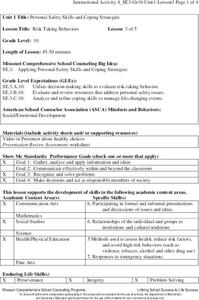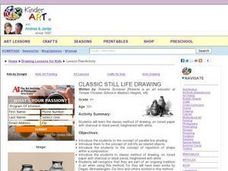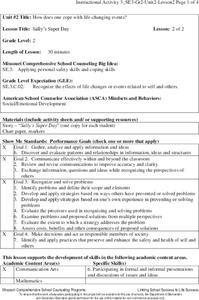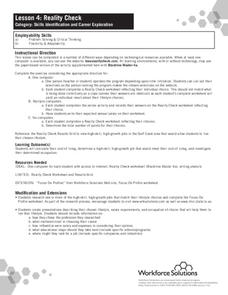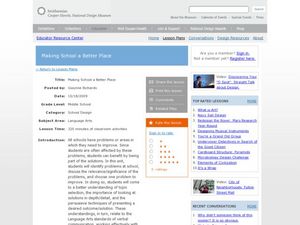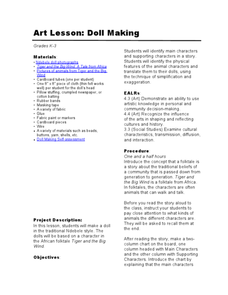Missouri Department of Elementary
To Give In or Not to Give In—That Is the Question!
No! A very simple word that can be very hard to say. Seventh graders have an opportunity to practice this difficult skill as they engage in a series of role-playing scenarios. As an exit ticket, 7th graders write a reflection on the...
Missouri Department of Elementary
What Are Bullying and Harassment? Part 2
After reviewing notes from the previous lessons, small groups obtain a scenario card that describes a situation in which bullying is happening. Peers discuss the event and brainstorm two solutions using the STAR method then present their...
Missouri Department of Elementary
Risk Taking Behaviors
Sophomores can be sometimes wise and sometimes foolish. The same can be said for their behaviors. After watching a presentation about risk taking behaviors, class members discuss the presentation in small groups, and then complete a...
Franklin D. Roosevelt Presidential Library & Museum
Role Playing Relating to Big Decisions
While most high schoolers are too young to vote, they still need to learn the skills needed to solve problems. The ninth resource in a 10-part civics series presents class members with four "What Would You Do?" scenarios that have them...
iCivics
Propaganda: What’s the Message?
As class members progress through eight fully prepared learning stations, they will identify how bias is present in persuasive media, as well as differentiate among types of propaganda techniques like bandwagon propaganda and the...
Curated OER
Classic Still Life Drawing
Provide your young artists with an opportunity to study the masters and their techniques to become skilled at drawing still life. They discuss and view images from artists like Degas and Michelangelo, practice drawing techniques such as...
Missouri Department of Elementary
Sally’s Super Day
After having a bad day, Sally took scholars' suggestions and had a super day. Pupils listen to her newest short story then discuss the events that occurred. They sort each event by what was in her control and what was not. Participants...
Missouri Department of Elementary
What are Comfortable (Good) and Uncomfortable (Bad) Feelings?
Two puppets open a discussion about comfrotable and uncomfortable touches. Scholars add to the discussion information they remember from a previous lesson plan, then delve deep into three problem-solving safety rules, and explore...
Missouri Department of Elementary
Safe and Healthy Life Choices (Part 2)
Scholars listen to a presentation by a health care professional and then submit three questions they would like the speaker to discuss further.
Missouri Department of Elementary
The Hope to Cope: Coping Skills
Making decisions can be stressful, even for sixth graders. And even students this young have developed coping skills, some positive and some negative, to help them deal with stress. Class members are asked to identify several of their...
Federal Trade Commission
A Smarter Consumer
How can understanding advertisements make people better consumers? With the fourth and final instructional activity from the Admongo series on advertising, scholars reflect on some of the questions they may ask about an ad before making...
Workforce Solutions
Reality Check
Talk about a reality check! High schoolers complete a lifestyle survey indicating their preference for housing, entertainment, etc., and then calculate the salary required to support those choices. Finally, they research the types of...
Overcoming Obstacles
Problem Solving on the Job
The truth is there are consequences for actions. The third lesson in the "Problem Solving Module" asks class members to brainstorm a list of problems, select one and invent a system, process, or object that might solve the problem. They...
Committee for Children
Students Learn to Stop Rumors Before They Start
Two activities look at how rumors are spread and ways class members can stop them. The first activity brings forth an in-depth conversation about how reporters gather information to write articles and how students can implement the same...
K20 LEARN
Ethos, Logos, Pathos: Persuading Your Audience
Ethics, emotion, reason—scholars investigate advertisers' persuasive techniques to attract buyers. After examining the techniques used in infomercials, writers craft a persuasive essay on a topic of their choice.
Social Media Toolbox
Reporting with Social Media
What does it take to create news stories that are both informative and objective? Aspiring journalists walk the line between engagement and activism with lesson 15 of a 16-part series titled The Social Media Toolbox. Grouped pupils...
Curated OER
Analyze Author’s Techniques, Including Figurative Language
Paul Laurence Dunbar's poem "He Had His Dream" is the focus of a quick exercise. Pupils read the poem and answer four multiple choice questions and one short answer question about specific lines in the poem and the author's purpose....
Curated OER
Research Techniques: Gathering Credible Sources
How can you spot a credible source? What even makes a resource reliable in the first place? Answer some of these questions with this presentation. Although intended for higher education, this PowerPoint could be modified for middle...
Missouri Department of Elementary
My Problem…Your Problem…Our Problem
Encourage sixth graders to take responsibility for their actions and become a problem solver. Pupils discuss new problems faced in sixth grade then identify ones that involve other people. A worksheet guides their practice in conflict...
Curated OER
Creating and Using a Checklist of Performance Techniques to Critique and Find the "Message" in Mass Media Performances
Students analyze and critique theater events by evaluating and constructing meanings from improvised and scripted scenes and from theater, film, television, and electronic media productions.
Curated OER
Making School a Better Place.
Middle schoolers study the problems in their school and work on solutions for those problems. In this writing process lesson, students analyze a problem and work as a team to find a solution. Middle schoolers present written and...
Curated OER
Economic Decisions
Students practice decision-making skills by planning vacation, including all proposed expenses. Students distinguish between needs and wants, identify difference between goods and services, and describe economic resources used in...
Curated OER
Doll Making
Young scholars discuss folktales and read Tiger and The Big Wind, listening for animal characters for later discussion. For this language arts lesson, students complete a T chart on characters and make a doll for one either chosen or...
Overcoming Obstacles
Defining Problems Big and Small
Problems come in all shapes and sizes, but the first step in solving a problem is to identify just what the problem is. Through a series of games and activities, middle schoolers learn first to identify a problem, decide on a solution,...




